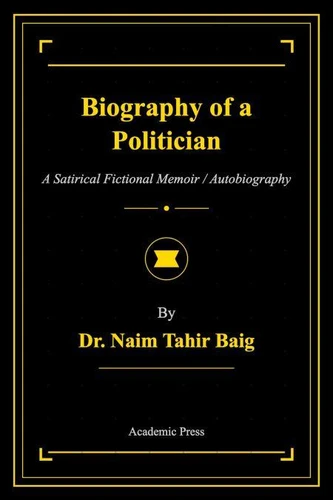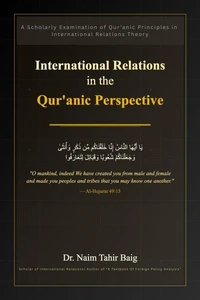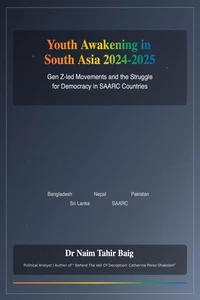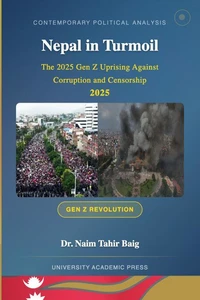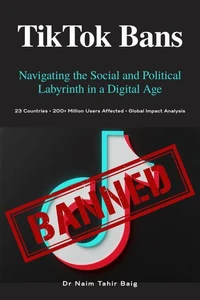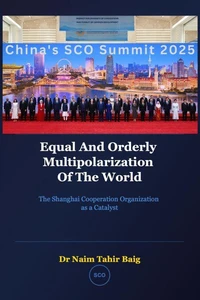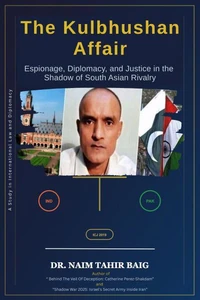Nouveauté
Biography of a Politician
Par :Formats :
Disponible dans votre compte client Decitre ou Furet du Nord dès validation de votre commande. Le format ePub est :
- Compatible avec une lecture sur My Vivlio (smartphone, tablette, ordinateur)
- Compatible avec une lecture sur liseuses Vivlio
- Pour les liseuses autres que Vivlio, vous devez utiliser le logiciel Adobe Digital Edition. Non compatible avec la lecture sur les liseuses Kindle, Remarkable et Sony
 , qui est-ce ?
, qui est-ce ?Notre partenaire de plateforme de lecture numérique où vous retrouverez l'ensemble de vos ebooks gratuitement
Pour en savoir plus sur nos ebooks, consultez notre aide en ligne ici
- FormatePub
- ISBN8232240639
- EAN9798232240639
- Date de parution14/09/2025
- Protection num.pas de protection
- Infos supplémentairesepub
- ÉditeurHamza elmir
Résumé
Book DescriptionBiography of a Politician: A Memoir represents a groundbreaking work in political psychology and corruption studies, presented through the innovative lens of fictional memoir. Dr. Naim Tahir Baig, renowned political scientist and expert in authoritarian studies, has crafted a sophisticated academic analysis disguised as the self-serving autobiography of Emmanuel Kofi, a fictional politician from the developing nation of Zambara.
This remarkable scholarly work exposes the psychological mechanisms of political corruption by allowing readers to witness firsthand how authoritarian leaders rationalize their actions. Through Kofi's own words, we observe the intricate mental gymnastics employed by corrupt politicians to justify nepotism as "family loyalty, " embezzlement as "pragmatic resource management, " and authoritarianism as "strong leadership." The memoir format creates an unprecedented window into the mind of a corrupt leader, revealing how power corrupts not just actions, but the very ability to perceive moral reality.
Dr. Baig's masterful construction allows readers to see through Kofi's self-justifications while understanding the systemic factors that enable such corruption in developing democracies. The work serves as both a psychological case study and a warning about the fragility of democratic institutions. By presenting corruption from the perpetrator's perspective, the book illuminates patterns of behavior that transcend cultural and geographical boundaries, making it essential reading for political scientists, policy makers, and citizens concerned with democratic governance.
The book's innovative approach-combining rigorous academic analysis with accessible narrative-makes complex theories of political pathology understandable to both scholars and general readers. Each chapter is meticulously crafted to reveal different aspects of corrupt leadership while maintaining the authenticity of a politician's memoir. This dual-purpose design serves as both an educational tool and a compelling literary work, demonstrating how fiction can serve as a powerful vehicle for academic inquiry.
Biography of a Politician stands as a significant contribution to the fields of political science, psychology, and corruption studies, offering insights that are both academically rigorous and immediately relevant to contemporary global politics.
This remarkable scholarly work exposes the psychological mechanisms of political corruption by allowing readers to witness firsthand how authoritarian leaders rationalize their actions. Through Kofi's own words, we observe the intricate mental gymnastics employed by corrupt politicians to justify nepotism as "family loyalty, " embezzlement as "pragmatic resource management, " and authoritarianism as "strong leadership." The memoir format creates an unprecedented window into the mind of a corrupt leader, revealing how power corrupts not just actions, but the very ability to perceive moral reality.
Dr. Baig's masterful construction allows readers to see through Kofi's self-justifications while understanding the systemic factors that enable such corruption in developing democracies. The work serves as both a psychological case study and a warning about the fragility of democratic institutions. By presenting corruption from the perpetrator's perspective, the book illuminates patterns of behavior that transcend cultural and geographical boundaries, making it essential reading for political scientists, policy makers, and citizens concerned with democratic governance.
The book's innovative approach-combining rigorous academic analysis with accessible narrative-makes complex theories of political pathology understandable to both scholars and general readers. Each chapter is meticulously crafted to reveal different aspects of corrupt leadership while maintaining the authenticity of a politician's memoir. This dual-purpose design serves as both an educational tool and a compelling literary work, demonstrating how fiction can serve as a powerful vehicle for academic inquiry.
Biography of a Politician stands as a significant contribution to the fields of political science, psychology, and corruption studies, offering insights that are both academically rigorous and immediately relevant to contemporary global politics.
Book DescriptionBiography of a Politician: A Memoir represents a groundbreaking work in political psychology and corruption studies, presented through the innovative lens of fictional memoir. Dr. Naim Tahir Baig, renowned political scientist and expert in authoritarian studies, has crafted a sophisticated academic analysis disguised as the self-serving autobiography of Emmanuel Kofi, a fictional politician from the developing nation of Zambara.
This remarkable scholarly work exposes the psychological mechanisms of political corruption by allowing readers to witness firsthand how authoritarian leaders rationalize their actions. Through Kofi's own words, we observe the intricate mental gymnastics employed by corrupt politicians to justify nepotism as "family loyalty, " embezzlement as "pragmatic resource management, " and authoritarianism as "strong leadership." The memoir format creates an unprecedented window into the mind of a corrupt leader, revealing how power corrupts not just actions, but the very ability to perceive moral reality.
Dr. Baig's masterful construction allows readers to see through Kofi's self-justifications while understanding the systemic factors that enable such corruption in developing democracies. The work serves as both a psychological case study and a warning about the fragility of democratic institutions. By presenting corruption from the perpetrator's perspective, the book illuminates patterns of behavior that transcend cultural and geographical boundaries, making it essential reading for political scientists, policy makers, and citizens concerned with democratic governance.
The book's innovative approach-combining rigorous academic analysis with accessible narrative-makes complex theories of political pathology understandable to both scholars and general readers. Each chapter is meticulously crafted to reveal different aspects of corrupt leadership while maintaining the authenticity of a politician's memoir. This dual-purpose design serves as both an educational tool and a compelling literary work, demonstrating how fiction can serve as a powerful vehicle for academic inquiry.
Biography of a Politician stands as a significant contribution to the fields of political science, psychology, and corruption studies, offering insights that are both academically rigorous and immediately relevant to contemporary global politics.
This remarkable scholarly work exposes the psychological mechanisms of political corruption by allowing readers to witness firsthand how authoritarian leaders rationalize their actions. Through Kofi's own words, we observe the intricate mental gymnastics employed by corrupt politicians to justify nepotism as "family loyalty, " embezzlement as "pragmatic resource management, " and authoritarianism as "strong leadership." The memoir format creates an unprecedented window into the mind of a corrupt leader, revealing how power corrupts not just actions, but the very ability to perceive moral reality.
Dr. Baig's masterful construction allows readers to see through Kofi's self-justifications while understanding the systemic factors that enable such corruption in developing democracies. The work serves as both a psychological case study and a warning about the fragility of democratic institutions. By presenting corruption from the perpetrator's perspective, the book illuminates patterns of behavior that transcend cultural and geographical boundaries, making it essential reading for political scientists, policy makers, and citizens concerned with democratic governance.
The book's innovative approach-combining rigorous academic analysis with accessible narrative-makes complex theories of political pathology understandable to both scholars and general readers. Each chapter is meticulously crafted to reveal different aspects of corrupt leadership while maintaining the authenticity of a politician's memoir. This dual-purpose design serves as both an educational tool and a compelling literary work, demonstrating how fiction can serve as a powerful vehicle for academic inquiry.
Biography of a Politician stands as a significant contribution to the fields of political science, psychology, and corruption studies, offering insights that are both academically rigorous and immediately relevant to contemporary global politics.

